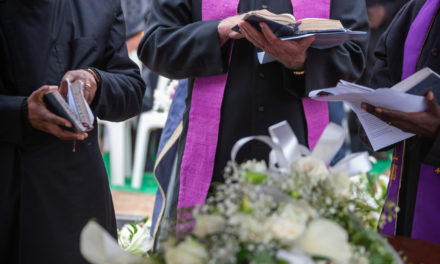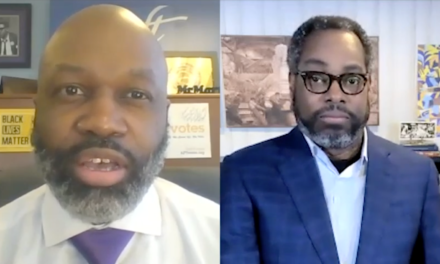For the past eight years, The LEE Group‘s President and CEO Mark S. Lee has put a focus on helping small businesses through the challenges of starting and sustaining a new venture. The past few years, however, COVID-19 has caused major disruptions to our economy and to the survival of small businesses. The LEE Group’s Small Business Workshop returns for its eighth year with a focus on business recovery and sustainability.
RELATED: Mark S. Lee Discusses the Changes to Workplace Diversity, Equity and Inclusion
Prior to the start of the virtual Small Business Workshop series, host Stephen Henderson sits down with Lee for some helpful tips for small businesses trying to recover from the challenges of COVID-19. Plus, David Girodat, Regional President of Fifth Third Bank for Eastern Michigan, the event’s sponsor, talks about the topic lineup for this year’s series, the issues small businesses face today and how small businesses can bounce back to re-establish a strong foundation for the future.
Full Transcript:
Stephen Henderson: So Mark, eight years. That’s a long time to be talking with small businesses about their needs and their challenges. Of course, this year, I think, is really different than lots of other years. Just because we are still watching small businesses, I think, figure out what the road to recovery looks like after the pandemic and decide what it means, I guess, to really come back.
Mark S. Lee, President & CEO, The Lee Group: Yeah, first of all, thanks for having me. Eight years is a long time. I thank all the viewers for your support. It clearly shows that we still have a need for this particular type of program in terms of supporting entrepreneurs. And, you know, we think about the evolving evolution of recovery.
Mark S. Lee: We thought we were in recovery last year, and here we are in 2022. We’re still trying to figure out what this thing called recovery looks like. And I think as we think about this year’s workshop, just a couple of things I want to briefly highlight for you if I could. One is a study was done recently by the U.S. Chamber of Commerce that really focused on that three-quarters of U.S. small businesses are still struggling financially.
Mark S. Lee: They still have some financial challenges, and a lot of their resources are still tied up. They’re short on resources because they had to use their resources to keep the business open during the pandemic and are coming out of the pandemic that is still a challenge. And now we’re finding that inflation and hiring are challenges as well. So whenever we think we’re focusing on that recovery, things continue to change as well.
Stephen Henderson: So tell me what the framing, I guess is for this year’s seminars, which are going to be virtual again and they’re going to unfold over May and June. What will small businesses be able to learn from all of this?
Mark S. Lee: And that’s a great question. We’re going to continue our virtual series. We’re going to focus on the road to recovery. What does that look like? And specifically, as I just referenced, there’s a challenge when it comes to hiring. How do you attract talent? What are your plans? What should you be executing? What should you be focused on? There’s still a challenge when it comes to access to capital. What are the grant programs, and financial opportunities out there, if you will, that people still tap into?
Mark S. Lee: And also, we’re going to be talking to business leaders to focus on what can we expect. We have a futurist, an economist from Fifth Third, is going to be talking about expectations for the balance of this year. And how do you navigate those challenges as we think about continuing to evolve and grow as part of this recovery process?
Stephen Henderson: Yeah. Dave, talk about from, I guess, the banking perspective, what you’re seeing and hearing from small businesses about what’s challenging them now that we’re at least a little bit on the other side of the pandemic, and I guess how that maybe looks different than it did before all of this happened.
David Girodat, Regional President-Eastern Michigan Fifth Third Bank: You know, Stephen, thanks. And you know, no. 1 Fifth Third is really excited to partner with Mark and his organization for the eighth year now and promoting small business true passion of myself and the organization that was committed to Marketplace. You know, framing things up. You know, I would look at if we had this discussion in December of last year, we’d be having a completely different dialog than we’re about to have with folks, you know, starting in May and June.
David Girodat: You know, when you look at the inflationary pressures that we’re experiencing, you know, around fuel cost, labor, labor supply, supply chain, logistics, you know, it is a different environment for small business owners, let alone when you start talking about access to capital and rising rates. So this is going to be, in my opinion, a little more of a science or excuse me, a little more of an art than a science type of year, because every situation is going to be different.
David Girodat: You know, if you’re able to absorb labor costs and push them through to the consumer and still be viable and compete in your industry, that’s great. But not all businesses are that way. You know, you think about a lot of its great small businesses around metropolitan Detroit, family-run, family staffed. You know, you’re providing a product and service that you can’t price yourself out of business. So those are things that we worry about; we stay focused on.
David Girodat: You know, we do think about those stats. You know, 50% of our employment base is small business-driven around the country. So their success is incredibly critical. And, you know, I probably have more interest now. I want to say I had covid to figure it out and PPP loans and what to do. But as Mark alluded to, that capital is gone and there’s not a lot of replacing that. So sustainability around small business is critical. We all work together and share the ideas and the knowledge that we have.
Stephen Henderson: Yeah. So talk a little about the lending environment. That is a key part, I think of, you know, the landscape for small businesses, not just in metro Detroit, but everywhere. And it’s a real challenge. Is it more challenging right now or less challenging for the businesses themselves to get access to capital?
David Girodat: I would tell you, depending on where you are in the cycle, Stephen, it’s going to determine, you know, what’s called the ease of access to capital. You know, business that they have a history and you can see the cycles of challenges maybe purely tried to covid, your banks can figure out underwrite through.
David Girodat: Luckily we still have great tools around the SBA and the partnerships we have there. I do think some organizations is going to take additional outside resources. That’s why some of the grant money and access to capital beyond just traditional banking needs is going to be necessary. It helps stabilize balance sheets. It helps, you know, give you time to put a forecast together, you know, projections.
David Girodat: You earn your way back to prosperity. You know, as an organization, we realize today that some businesses were severely impacted and are not showing the profitability that they had. We had a great trajectory in Q4, say, okay, we’re back on track. Now, a little bit of level setting and this sort of education is so important. Have you adjusted to absorb that labor costs, those fuel costs, you know, the interest rate environment?
David Girodat: So once again, that arts going to come into play a little bit almost by industry that we work together and see money’s still there. There’s still capital and tremendous liquidity in the marketplaces. That’s the great news. But banks, it is our job to get those dollars deployed to small business owners to keep things moving.
Stephen Henderson: So Mark, I wonder if, you know, at any given moment you can see it as a moment of challenge, I suppose, or a moment of opportunity, or maybe it’s always a little bit of both. But I wonder if you can talk a little about if somebody right now has an idea to start a business. Is this a good time to be doing that? Is this sort of post-COVID or pre-post-COVID dawn a good time to say I’m going out on my own and going to take my chances?
Mark S. Lee: You know what? That’s a great question. I would challenge people. You have to be smart. Extra smart, extra prepared as you’re starting a business right now. Is it a good time to suddenly start a business? You have to assess your strengths, your opportunities, and your financials. Do you have that plan? Do you have that strategy? Do you have that board of advisors?
Mark S. Lee: It’s going to take a great level of planning to certainly think about starting a business. You know, we’ve always had challenges in this country. This is a resilient country, this is a resilient city. And we always have people starting businesses during challenging times.
Mark S. Lee: So I’m going to answer the question by simply saying if you’re interested in starting a business, do your homework, have the proper planning in place, and ensure that you have resources in place to help you get to the next level. Then rely on institutions such as Fifth Third to provide you with resources and support moving forward.
Stephen Henderson: What about businesses that had been thinking about expansion before the pandemic, saw the pandemic disrupt all of that and now have to reassess? Is this time to kind of hold steady and keep your all your ducks in a row for a boom later? Or is that boom here now?
Mark S. Lee: With the boom is not here yet, Steve. I want to make it crystal clear. Now is the time to still retrench. Look at the full assessment of your business and see where you are today. Determine where you need to invest your resources today and in the future. And I want you to plan. Be very pragmatic, systematic and strategic as you think about growth.
Mark S. Lee: Don’t assume that the boom is here. The pandemic has challenged all of us to go back and reassess what we are today. That should be your that should be what you use to plan on a go-forward basis.
Stephen Henderson: And Dave talked just a little about the again, the lending environment for people who are thinking about starting a business. Is that tougher right now for people who are thinking about growing their business?
David Girodat: Steve, I tell you, first off, on starting a business, you know, a lot of great businesses started, you know, in the midst of diversity against them, you know, great ideas and great concepts are always welcome to be heard by all, including the banks. Then, you know, going to Mark’s comments, just where are you in the planning process? And expectations are critical.
David Girodat: You know, the banker will ask you a lot of questions today about customer acquisition, labor, cost of goods sold. So, it’s kind of a big boy dialog, but it’s one you have to have to be honest where you are in starting something up. But I think we’re going to see some great things come out of all this. You know, there’s someone’s got a great idea and it is going to show up.
David Girodat: Expansion, I think depending where you’re at and it’s kind of your time back in the market, if you’re looking out, you know, 90, 180 days and you see that with opportunities on your horizon, you need to start thinking about how do I capture or position myself for that now. You know your lead time because of the supply chain, if you have to buy equipment, it’s not like you’re running down to the corner and it’s there waiting for you.
David Girodat: So you really do have to plan effectively. Think about your access to labor. Do you have your are your people ready and trained? So I’m optimistic as we get into the second half of the year. And I think when you get into the seminars, you’re going to hear some of that commentary from Fifth Third people.
David Girodat: But I am one to say I’m a planner and you know, I like to think long term. This isn’t about a 90-day cycle. This is probably the next year that we’re going to battle through these things and we’ll come out stronger on the end. And once again, it’s going to be led by small business and the idea that they bring, their entrepreneurs and innovators.
Subscribe to Detroit Public Television’s YouTube Channel & Don’t miss American Black Journal on Tuesday at 7:30 p.m and Sunday at 9:30 a.m. on Detroit Public TV, WTVS-Channel 56.
Catch the daily conversations on our website, Facebook, Twitter and Instagram @amblackjournal.
View Past Episodes >
Watch American Black Journal on Tuesday at 7:30 p.m. and Sunday at 9:30 a.m. on Detroit Public TV, WTVS-Channel 56.




